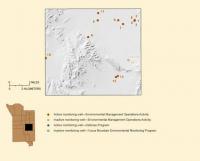-
Death of ISIS’s most senior military leader confirmed

A senior ISIS leaders, Omar the Chechen, has died after being seriously injured in a U.S.-led coalition strike in northeastern Syria, the Pentagon confirmed Monday. The Pentagon’s announcement clears up the fate of Omar al-Shishani a week after a U.S. official said the most-wanted militant had been targeted in a 4 March attack on the jihadist’s convoy. Shishani was one of the most-wanted ISIS leaders, and the United Stateshas put a $5 million reward on his head.
-
-
American ISIS fighter captured in northern Iraq
Muhammad Jamal Amin, a 27-year old American from Virginia who joined ISIS and fought in its ranks, was taken into custody in northern Iraq. He was captured by Kurdish forces after trying to cross into Turkey. Amin is the first American fighting with ISIS to have surrendered in the field.
-
-
Three gun-safety laws in effect in some states could significantly reduce gun deaths
A nationwide study which analyzes the impact of gun-control laws in the United States has found that just 9 of 25 state laws are effective in reducing firearm deaths. The research suggests that three laws implemented in some states could reduce gun deaths by more than 80 percent if they were implemented nationwide. Laws requiring firearm identification through ballistic imprinting or microstamping were found to reduce the projected mortality risk by 84 percent; ammunition background checks by 82 percent; and universal background checks for all gun purchases by 61 percent. Nineother states laws — such as the so-called “Stand your Ground” laws — were associated with increased mortality.
-
-
1,500 people killed in 160 documented chemical attacks in Syria since 2011

The Syrian American Medical Society (SAMS) earlier today (Monday) released a report detailing 161 chemical attacks in Syria since the conflict emerged in 2011. These attacks have killed nearly 1,500 people in Syria, according to the report. A UN war crimes expert says the documentation of the attacks will allow for international prosecution in the future.
-
-
ISIS attacks Iraqi town with chemical weapons

Iraqi officials has said that ISIS has launched two chemical attacks near the city of Kirkuk in northern Iraq, killing a three-year-old girl and wounding up to 600 people. The chemical attacks took place early Saturday in the town of Taza, security and hospital officials said place early on Saturday in the small town of Taza. The town was struck by several rockets carrying the chemicals.
-
-
600 ISIS fighters killed in past three weeks: Kerry
Secretary of State John Kerry, in Paris for talks on the future of Syria, said that ISIS has lost 600 fighters and thousands of square kilometers of territory over the past three weeks. “In Syria, over the last three weeks alone, Daesh [ISIS] has lost 3,000 sq km (1,160 sq miles) and 600 fighters,” Kerry said.
-
-
Northcom’s first priority: “No-Fail” homeland defense
Homeland defense is the first priority of U.S. Northern Command, Navy Adm. William E. Gortney told members of the House Armed Services Committee last Thursday. Gortney named ISIS and whatever form it takes in the future, and transnational organized criminals who move drugs, people, weapons and anything else that will turn a profit as the most dangerous and likely threats to the nation.
-
-
ISIS bolsters its position in Libya by claiming to defend it against “foreign invaders”: UN

ISIS has greatly expanded its control over territory in Libya, and the Islamist militants are now claiming to be the defenders of the North African state against foreign military intervention, according to UN sanctions monitors. The number of ISIS fighters in the country is now estimated to be around 6,000.
-
-
U.K. to destroy biometric information of 45 terror suspects due to botched paperwork
British security agencies will have to destroy fingerprints and DNA of forty-five terror suspects because the police retained the biometric samples longer than the law allows. The law does allow the police to keep biometric information of terrorism suspects indefinitely, but certain paperwork must be completed within a certain period of time to allow that, and if the paperwork is not completed, the samples must be destroyed. A new report reveals that Britain holds biometric information and materials on nearly 8,000 suspects.
-
-
U.S. captures head of ISIS chem weapons unit; targets ISIS chem weapons infrastructure

U.S. Special Forces operating in Iraq captured the head ISIS chemical weapons unit. Sleiman Daud al-Afari, who worked for Saddam Hussenin’s now-disbanded Military Industrialization Authority where he specialized in chemical and biological weapons, was captured during a raid near the northern Iraqi town of Tal Afar last month.American and Iraqi officials say that there are many indications that ISIS is working hard to develop chemical weapons.
-
-
Trump’s campaign rhetoric, ISIS and the law of war
Presidential candidate Donald Trump said that one reason the U.S. war against ISIS is “ineffective” is that “We’re fighting a very politically correct war.” Exactly what Trump is suggesting doing is not clear, but it is significant that Trump recently acknowledged that the U.S.“is bound by laws and treaties” and that as president he would “not order a military officer to disobey the law.” Instead, he said he would “seek [the] advice” of military and other officials. This is good news, and something all the candidates – and their critics – ought to embrace, as applying the law of war in the twenty-first century is much more complicated than many think. Words do matter, and where the nation’s security is concerned, no words can be more important..
-
-
State-level immigration policies should be subject of cost-benefit analysis
While immigration policy has been the purview of the U.S. federal government, nearly all states have taken a more-active role on the issue of unauthorized immigration in the past fifteen years through actions such as making drivers licenses available regardless of immigration status and requiring employers to verify eligibility to work, according to a new study. States, however, rarely examine the costs and benefits of such policies before enacting them, suggesting the need for a comprehensive tool to help state policymakers assess the full range of costs and benefits of immigration policies before they are adopted.
-
-
Senior ISIS leader Abu Omar al-Shishani killed in U.S. strike

Abu Omar al-Shishani, a Syrian-based Georgian national who was a senior ISIS leader, was killed in a 4 March air strike by the U.S.-led coalition. U.S. officials said that the militant was killed near the Syrian town of al-Shadad. He had a reputation as a close military adviser to ISIS’s leader Abu Bakr al-Baghdadi, who relied heavily on Shishani.
-
-
ISIS plotted to kidnap Malaysia’s prime minister, other high officials
Ahmad Zahid Hamidi, Malaysia’s deputy prime minister, said Malaysia had foiled a plot by ISIS to kidnap government leaders, including the country’s prime minister. Hamidi to say that jihadists attempted to kidnap him and two other Malaysian officials — including the prime minister Najib Razak and the defense minister, Hishammuddin Hussein.
-
-
Secretive Area 6 used to test aerial radiation detection equipment

Top-secret Nevada site – even more secret than neighboring Area 51 — is used by Pentagon, DHS to test drones equipped with sensors to detect radioactive material which could be used in dirty bombs. The site, located in Yucca Flat, was once used for nuclear testing.
-
More headlines
The long view
What Does Netflix’s Drama “Adolescence” Tell Us About Incels and the Manosphere?
While Netflix’s psychological crime drama ‘Adolescence’ is a work of fiction, its themes offer insight into the very real and troubling rise of the incel and manosphere culture online.
A Shining Star in a Contentious Legacy: Could Marty Makary Be the Saving Grace of a Divisive Presidency?
While much of the Trump administration has sparked controversy, the FDA’s consumer-first reforms may be remembered as its brightest legacy. From AI-driven drug reviews to bans on artificial dyes, the FDA’s agenda resonates with the public in ways few Trump-era policies have.
The Center Can Hold — States’ Rights and Local Privilege in a Climate of Federal Overreach
As American institutions weather the storms of executive disruption, legal ambiguity, and polarized governance, we must reexamine what it means for “the center” to hold.
How to Reverse Nation’s Declining Birth Rate
Health experts urge policies that buoy families: lower living costs, affordable childcare, help for older parents who want more kids
Foundation for U.S. Breakthroughs Feels Shakier to Researchers
With each dollar of its grants, the National Institutes of Health —the world’s largest funder of biomedical research —generates, on average, $2.56 worth of economic activity across all 50 states. NIH grants also support more than 400,000 U.S. jobs, and have been a central force in establishing the country’s dominance in medical research. Waves of funding cuts and grant terminations under the second Trump administration are a threat to the U.S. status as driver of scientific progress, and to the nation’s economy.
The True Cost of Abandoning Science
“We now face a choice: to remain at the vanguard of scientific inquiry through sound investment, or to cede our leadership and watch others answer the big questions that have confounded humanity for millennia —and reap the rewards.”
